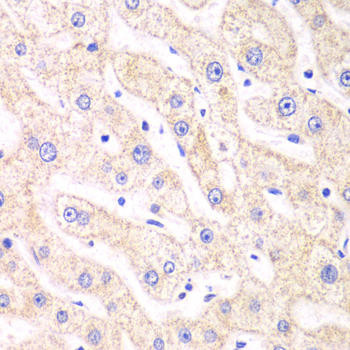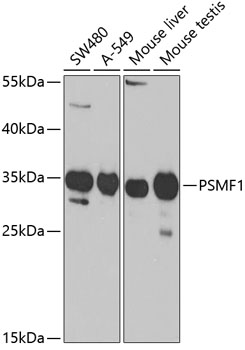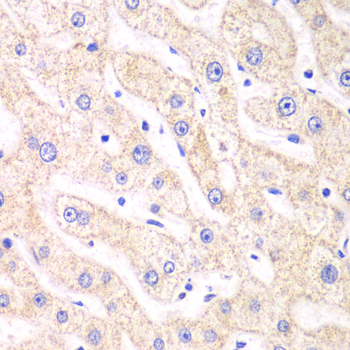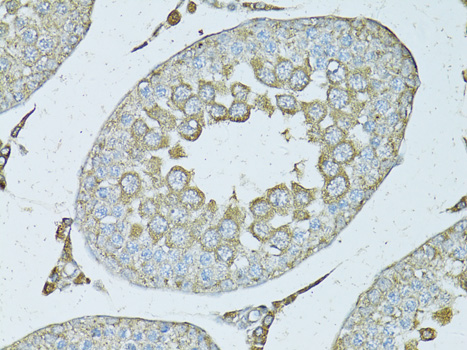| Background: | The 26S proteasome is a multicatalytic proteinase complex with a highly ordered structure composed of 2 complexes, a 20S core and a 19S regulator. The 20S core is composed of 4 rings of 28 non-identical subunits; 2 rings are composed of 7 alpha subunits and 2 rings are composed of 7 beta subunits. The 19S regulator is composed of a base, which contains 6 ATPase subunits and 2 non-ATPase subunits, and a lid, which contains up to 10 non-ATPase subunits. Proteasomes are distributed throughout eukaryotic cells at a high concentration and cleave peptides in an ATP/ubiquitin-dependent process in a non-lysosomal pathway. An essential function of a modified proteasome, the immunoproteasome, is the processing of class I MHC peptides. This gene encodes a protein that inhibits the activation of the proteasome by the 11S and 19S regulators. Alternative transcript variants have been identified for this gene. |
| UniProt Protein Function: | PSMF1: Plays an important role in control of proteasome function. Inhibits the hydrolysis of protein and peptide substrates by the 20S proteasome. Also inhibits the activation of the proteasome by the proteasome regulatory proteins PA700 and PA28. Belongs to the proteasome inhibitor PI31 family. |
| UniProt Protein Details: | Chromosomal Location of Human Ortholog: 20p13 Cellular Component: nucleoplasm; proteasome core complex; membrane; endoplasmic reticulum; cytoplasm; cytosol Molecular Function:protein binding; endopeptidase inhibitor activity Biological Process: positive regulation of ubiquitin-protein ligase activity during mitotic cell cycle; ubiquitin-dependent protein catabolic process; negative regulation of ubiquitin-protein ligase activity during mitotic cell cycle; protein polyubiquitination; viral reproduction; apoptosis; antigen processing and presentation of exogenous peptide antigen via MHC class I, TAP-dependent; DNA damage response, signal transduction by p53 class mediator resulting in cell cycle arrest; regulation of apoptosis; antigen processing and presentation of peptide antigen via MHC class I; regulation of ubiquitin-protein ligase activity during mitotic cell cycle; anaphase-promoting complex-dependent proteasomal ubiquitin-dependent protein catabolic process; antigen processing and presentation of exogenous peptide antigen via MHC class I; gene expression; mitotic cell cycle; regulation of amino acid metabolic process; G1/S transition of mitotic cell cycle; negative regulation of apoptosis |
| NCBI Summary: | The 26S proteasome is a multicatalytic proteinase complex with a highly ordered structure composed of 2 complexes, a 20S core and a 19S regulator. The 20S core is composed of 4 rings of 28 non-identical subunits; 2 rings are composed of 7 alpha subunits and 2 rings are composed of 7 beta subunits. The 19S regulator is composed of a base, which contains 6 ATPase subunits and 2 non-ATPase subunits, and a lid, which contains up to 10 non-ATPase subunits. Proteasomes are distributed throughout eukaryotic cells at a high concentration and cleave peptides in an ATP/ubiquitin-dependent process in a non-lysosomal pathway. An essential function of a modified proteasome, the immunoproteasome, is the processing of class I MHC peptides. This gene encodes a protein that inhibits the activation of the proteasome by the 11S and 19S regulators. Alternative transcript variants have been identified for this gene. [provided by RefSeq, Jul 2008] |
| UniProt Code: | Q92530 |
| NCBI GenInfo Identifier: | 134047876 |
| NCBI Gene ID: | 9491 |
| NCBI Accession: | Q92530.2 |
| UniProt Secondary Accession: | Q92530,Q9H4I1, A0AVQ9, D3DVW3, |
| UniProt Related Accession: | Q92530 |
| Molecular Weight: | 29,817 Da |
| NCBI Full Name: | Proteasome inhibitor PI31 subunit |
| NCBI Synonym Full Names: | proteasome (prosome, macropain) inhibitor subunit 1 (PI31) |
| NCBI Official Symbol: | PSMF1 |
| NCBI Official Synonym Symbols: | PI31 |
| NCBI Protein Information: | proteasome inhibitor PI31 subunit; hPI31; proteasome inhibitor hP131 subunit |
| UniProt Protein Name: | Proteasome inhibitor PI31 subunit |
| Protein Family: | Proteasome inhibitor |
| UniProt Gene Name: | PSMF1 |
| UniProt Entry Name: | PSMF1_HUMAN |









